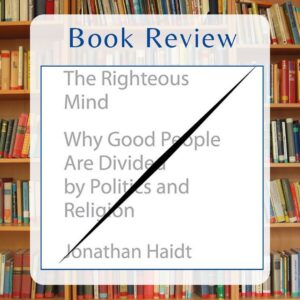
The Righteous Mind: Why Good People Are Divided by Politics and Religion
by Jonathan Haidt
Book Review by Kristine Madera
 In The Righteous Mind: Why Good People Are Divided by Politics and Religion, social psychologist Jonathan Haidt plunges into the modern third rail by looking at how morals divide people primarily in religion and politics. By morals, he doesn’t mean a particular set of morals, but of individual and group moral parameters and values.
In The Righteous Mind: Why Good People Are Divided by Politics and Religion, social psychologist Jonathan Haidt plunges into the modern third rail by looking at how morals divide people primarily in religion and politics. By morals, he doesn’t mean a particular set of morals, but of individual and group moral parameters and values.
He likens the mind to an elephant and rider, with the rational mind rider steering the intuitive, instinctive, reactionary elephant that is actually in charge. The elephant, Haidt says, has an immediate internal response to things and the rider acts like a rational press secretary who comes up with reasons, which may be highly irrational, to follow the reaction of the elephant. Each person’s elephant is shaped by both genes and experience, shaping the elephant and its reactions to be more liberal or conservative—the binary he splits people into. Liberal-minded people, he says—backed up with brain scans, tend to be more open to new experiences and less threatened by fear and change. They focus on the morality of compassion, freedom, and fairness, which leads them to stand up for the underprivileged and marginalized. Conservative brains consider a wider moral structure that includes compassion, freedom, fairness, justice, loyalty, authority, and sanctity.
When these two groups try to talk to each other using their rider’s “rational” and “evident” reasoning valued by their group, they can rarely convince the other—because each person or group is driven by their elephants.
Haidt also talks about individual humans as 90% chimp and 10% hive, meaning that we are mostly competitive but are also highly cooperative. When we focus on the chimp, and on our differences, cooperation and care decrease. When we focus on our commonalities, cohesion, and care increase within the group.
In this deeply polarizing time, Haidt says, liberals—of which he is one—do a disservice to themselves and society by focusing so much on our differences while ignoring more traditional values of family, religion, and loyalty. This makes them less cohesive as a political force. Conservatives, in a world and country with an increasing interaction of ethnicities, religions, and identity groups, limit themselves by denying this reality and focusing on ingroups that exclude and isolate ever more spheres of people.
Can the two sides ever come together? Haidt doesn’t have a prescription for that beyond learning to speak to one another’s elephant to find common hive ground. But he also suggests that there is a place for both ways of thinking and that the globe would be a more peaceful, prosperous place if we were able to find ways to communicate and solve problems using both the universalist liberal minds and the more ordered worldviews of conservatives.

About Kristine
Kristine Madera is a #1 bestselling Amazon author, novelist, hypnotherapist, and pro-topian with a passion for helping people better themselves and the world. Informed by global travel, teaching abroad, and a stint as a Peace Corps Volunteer, Kristine believes that everyone plays a part in imagining and creating our collective future.
Volunteering at Mother Teresa’s Home for the Dying in Calcutta inspired her novel, God in Drag. She birthed her upcoming novel, The Snakeman’s Wife, as a Peace Corps Volunteer in Papua New Guinea.
Read the first chapter of God in Drag HERE
